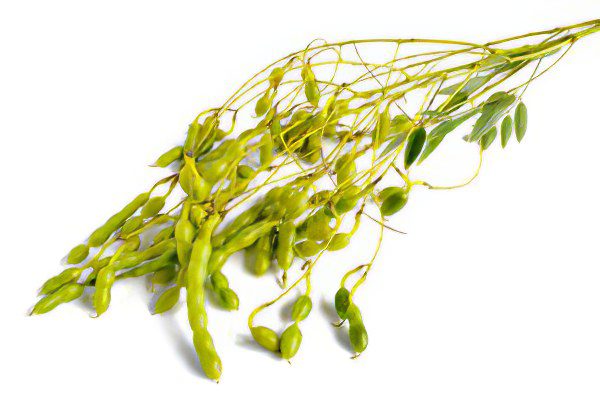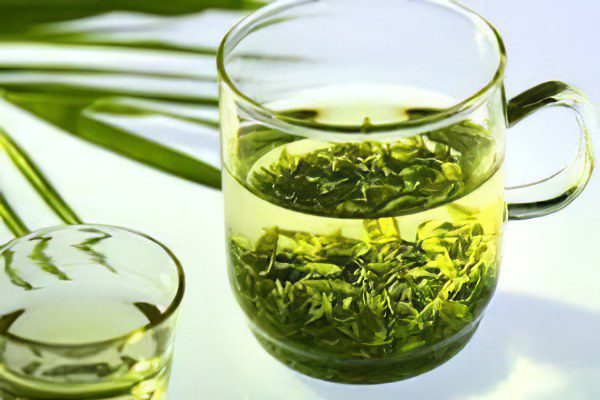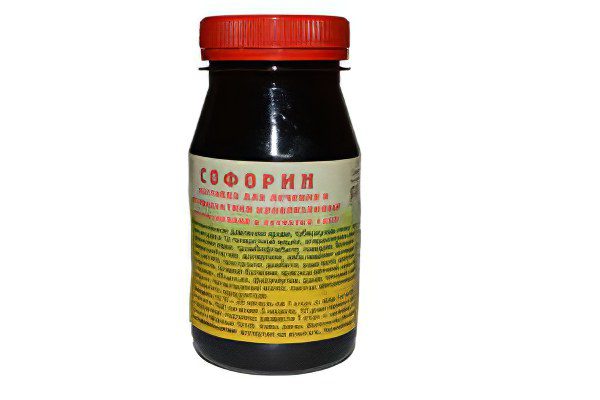Contents
Sophora Japanese – a large deciduous tree of the legume family, reaching a height of 25-30 meters. It has a powerful root system, branched stems and a wide crown. The leaves are pinnate, elliptical, growing in pairs. Stems and leaves are pubescent with light adpressed hairs. The flowers are yellowish, moth-like, collected in dense apical racemes. The fruits are slightly constricted club-shaped beans. The fruits ripen 3-6 seeds of reddish or black color.
Sophora blooms in July-August, the fruits ripen in September-October, do not fall from the branches all winter. The plant is common in China, Japan, Vietnam, Transcaucasia, Central Asia, in the south of Ukraine.
Useful properties of Japanese Sophora

Sophora japonica contains a large amount of alkaloids: in leaves – 3%, in seeds – 4%, in roots 2-3%. They form the basis of the chemical composition of the plant. In addition, phenolic dyes are present in the roots, and up to 6% fatty oil in the seeds. Also, bioactive substances such as kaempferol, quercetin, flavonoids, organic acids and vitamin C have been isolated from different parts of Sophora.
In addition, rutin, which has the properties of vitamin P, was found in the flowers of the plant. This substance well reduces the fragility of capillaries, therefore it is indispensable in the treatment of diabetes mellitus, typhus and measles. Doctors in some countries of Southeast Asia suggest that specially prepared flowers of the plant can prevent the occurrence of a stroke, since the substances contained in them effectively strengthen the walls of blood vessels and lower blood pressure.
Unblown buds and fruits of the plant are used as medicinal raw materials. The buds are cut in June-July, when they are just beginning to bloom, the fruits are harvested after ripening, carefully breaking off or cutting off the pods with secateurs in dry weather. The collected raw materials are cleaned of twigs and impurities and sent for drying as soon as possible. Fruits and flowers are dried in well-ventilated rooms or in dryers at a temperature of 25-30 ° C, stirring occasionally. Store finished raw materials in multilayer paper bags.
The healing properties of Sophora japonica
What are the benefits of preparations based on Japanese Sophora:
Return elasticity to the walls of blood vessels, making them less fragile and brittle;
Regulate the metabolism of many systems of the human body and metabolic processes in it, allowing you to lower blood glucose and cholesterol levels;
Cleans blood vessels from cholesterol plaques;
Significantly reduce the level of blood pressure;
They clean the subcutaneous vessels to the capillary level, they intensively supply blood to the hair follicles and stimulate hair growth;
Contribute to strengthening the immune system and, thereby, reduce the likelihood of allergic reactions;
Improve blood supply to tissues, which has a positive effect on the prevention of strokes, heart attacks and visual impairment associated with the trophism of the vessels that feed the eye;
Reduce swelling of tissues and joints;
They fight prothrombin of capillaries and small vessels of the scalp, which helps in the fight against baldness.
The positive effect of Japanese Sophora on the circulatory system makes it an indispensable remedy for such serious complications of diabetes as diabetic atherosclerosis with numbness of the legs and the development of gangrene. This complication, which threatens the life of the patient, begins its development with the darkening of the fingers of the lower extremities, in advanced cases it threatens with amputation and death.
Japanese Sophora also helps with complications of obliterating endarteritis – spontaneous gangrene. With this disease, the arteries of the lower leg and foot are affected. Their lumen narrows, the general blood supply to the tissues of the extremities is disturbed. The effect of taking preparations based on Sophora is already noted on the 4th-5th day, when an improvement in blood supply becomes noticeable.
Japanese Sophora in medicine
Preparations made on the basis of this plant are used to treat the most severe forms of tuberculosis, even with the formation of cavities in the lungs. These pathological changes stop in their development, the process of regeneration starts. Sophora preparations act as an antihelminthic for all types of parasites. They are especially effective on hepatic worms.
The effectiveness of Japanese Sophora has also been proven in the treatment of pathologies of the digestive tract. Medicines created on its basis regenerate the gastric mucosa, neutralize excessive acidity of gastric juice, and have a positive effect on pancreatic tissue.
Hypoglycemic (hyperglycemic) properties of sophora allow it to be used at any stage of diabetes:
In the initial stages – as the only drug, subject to the principles of dietary nutrition;
In complicated forms – in combination with drugs for the treatment of the underlying disease.
The stimulating properties of this universal remedy are widely used in the treatment of impotence and for the normalization of blood pressure in hypotension. As a local remedy, extracts and infusions with this medicinal plant are used as a compress, washing, wet applications and dressings, rinsing and irrigation of various cavities of the human body and skin lesions.
The use of sophora

In traditional medicine, the drug Pahikarpin, obtained from the herb of the plant, is used. It is used to relieve hypertensive crises, as well as in some other diseases accompanied by spasms of peripheral vessels. The drug is effective in myopathies.
In folk medicine, various medicinal forms of the plant are used. For example, sophora infusions are used for pulmonary bleeding, skin diseases, diseases of the liver and stomach. Orally, preparations from the fruits are prescribed for sleep disorders, high blood pressure, to improve appetite. Sophora decoctions and infusions are good for dysentery, gastric and duodenal ulcers, and inflammatory processes.
Sophora is one of the most popular medicinal plants for the treatment of hemorrhagic vasculitis. It is effective even in diseases such as angina pectoris and hypertension, rheumatism, diabetes mellitus, sclerotic stratification of the walls of blood vessels. Sophora is indispensable for diseases of the stomach and liver.
Sophora fruits
Sophora fruits serve as a raw material for the preparation of medicines, the most valuable biologically active substance of which is rutin. In traditional medicine, powders, tablets and infusions are produced from the fruits of the plant. They are used to treat trophic ulcers and deep wounds, they are also used in the form of lotions for purulent wounds. The bactericidal effect of fruits is due to the presence of quercetin and genistein in them.
In folk medicine, the fruits are used to prepare infusions and tinctures. Outwardly, these drugs are often prescribed for the treatment of burns, frostbite, trauma, skin tuberculosis, lupus, trophic ulcers and psoriasis. Internally, they are used to prevent and stop internal bleeding of various etiologies, as well as to treat atherosclerosis, angina pectoris, diabetes mellitus, hypertension, typhus, liver diseases, and hemorrhoids.
An infusion of the fruit treats inflammation of the gums, runny nose, barley. Alcohol and ether extracts from fruits have antimicrobial activity against Staphylococcus aureus, hay and Escherichia coli.
Sophora japonica tincture
Sophora tincture is the most common type of medicine made from the fruit of the tree. For tincture, you can use both fresh and dried fruits.
How to make Sophora japonica tincture? The tincture is easy to make at home. For its preparation, fresh fruits are taken in a weight ratio to alcohol of 1: 1, dry fruits – 1: 2. Raw materials must first be crushed, then placed in a dark glass dish and poured with a 70% alcohol solution. It takes three weeks to infuse the drug in a dark place at room temperature. After the expiration date, the tincture should be filtered, squeezed and stored in a dark, cool place in a dark glass bottle.
Sophora tincture treatment. Sophora tincture is used to treat a huge number of diseases. For example, it is effective in the treatment of rheumatism, sepsis, gastritis and ulcerative colitis, gastric and duodenal ulcers. It is prescribed for diseases of the kidneys and liver, typhus, diarrhea, early stages of tuberculosis, and also for worms. The tincture is prescribed for the prevention of internal bleeding of various origins.
The drug is widely used as an external agent for the treatment of carbunculosis and furunculosis, eczema, fungal diseases, scaly lichen, mild and moderate wounds, frostbite and burns of the 1st, 2nd and 3rd degree of severity. In a diluted form, tincture lubricates the scalp to prevent hair loss.
Sophora based recipes

There are many recipes for the preparation of drugs based on sophora. And all of them have a blood-purifying, wound-healing, analgesic, anti-inflammatory and antibacterial effect. Despite the fact that the mechanism of the therapeutic action of sophora is not fully understood, recipes based on it are increasingly used by physicians who know and choose the healing properties of the plant. For the preparation of decoctions, infusions, extracts, ointments and other medicines from sophora, fruits and unblown flowers (buds) of the plant are harvested at a certain time.
Sophora infusion. The infusion is used for frequent bleeding and increased capillary permeability, it is prescribed for retinal hemorrhage.
Recipe 1. To prepare the infusion, it is necessary to grind 20 g of dried flowers into powder, then pour 250 ml of boiling water over them and leave for about two hours. The infusion should be filtered and taken 1-2 tablespoons three times a day after meals.
Recipe 2. For outdoor use 20 g of crushed fruits are poured into 250 ml of boiling water, insisted for 15 minutes. and then filtered. Infusion is recommended to wash your hair in case of hair loss.
Sophora decoction. It is used as an antipyretic, for the treatment of malaria, pulmonary tuberculosis, neurasthenia and neuritis, and is also used as a sedative for jaundice, fever, and malignant tumors.
Recipe 1. 1 tablespoon of finely chopped roots is required to pour 1 cup of boiling water, simmer in a water bath for 10-12 minutes, cool and strain, then add boiled water to the previous volume. Take the medicine 25 g three times a day.
Recipe 2. 20 grams of the fruits of the plant should be poured with 200 ml of boiling water, boiled over low heat for 15 minutes. The broth should be cooled and filtered, and then thoroughly rubbed into the hair roots, after 5 minutes, rinse the hair well.
Sophora extract. Outwardly, the extract is used to strengthen and grow hair. It helps well with burns, purulent wounds, bedsores, psoriasis, ulcers of the lower extremities with varicose veins, diabetes, osteomyelitis. Rutin, present in the extract, protects the human skin from free radicals, thereby stopping skin aging.
Sophora extract contains ethyl alcohol, purified water, glycerin, fruits and inflorescences of the plant. The drug is widely used as a cosmetic product.
Medicines with Sophora japonica
On the basis of this plant, which has exceptional healing properties, many herbal remedies have been created.
They are classified as dietary supplements, and are used in the following cases:
For the treatment of pathologies of the peripheral circulatory system and their prevention;
With dermatoses of various etiologies, alopecia (baldness);
For relief of complications of diabetes mellitus;
With venous insufficiency;
For the treatment of sexual impotence (impotence) and other disorders of the male genital area;
With bleeding;
To increase immunity at increased loads, increase the adaptive capabilities of the body.
Conservative medicine uses Japanese Sophora as a raw material for the production of medicines.
Pachikarpin
The drug is available in the form of tablets and solution in ampoules for injection, it is used to treat the following conditions of the body:
In obstetric practice: to stimulate contractions in labor, to stop bleeding after childbirth.
With inflammation of the nerve nodes;
In the treatment of obliterating endarteritis;
For the prevention and treatment of spasms of peripheral vessels;
In myopathies.
Method of administration: orally before meals, and in the form of subcutaneous injections (for stopping spasms and stimulating labor).
The use of Pahikarpin in the treatment of various diseases:
Inflammation of the nerve nodes – the duration of treatment is 2 weeks, 2 times a day you need to take 0,5-1 g;
Myopathy – treatment is 1,5 – 2 months, it is carried out 3 times a year, 0,1 g is taken per day;
Obliterating endarteritis – the course of treatment is 1-1,5 months, it may be repeated after 2-3 months. Take 0,05-0,1 g of the drug 3 times a day.
The maximum allowable dose for adults is 0,2 g, the daily dose is 0,6 g, with subcutaneous injections, a single dose is not more than 0,15 g, the daily dose is not more than 0,45 g.
Soforin

The medicine is produced in the form of a tincture of unfermented Sophora fruits in 48% ethyl alcohol.
It is used for external treatment of skin lesions:
burns,
Abscesses
trophic ulcers,
Phlegmons.
With the help of Soforin, irrigation, washing are carried out, therapeutic compresses are made. Internal use of tincture is allowed in accordance with the dosage prescribed by the instructions. Contraindications to the use of the drug should be taken into account – this is an individual intolerance to the components of Soforin.
Ascorutin
Available in the form of tablets, the main indications for use:
Treatment of pathologies of capillaries, especially vessels affected by the intake of salicylates and anticoagulants, as well as prevention of diseases of the peripheral circulatory system;
Treatment of hypovitaminosis associated with a lack of vitamins P and C;
Treatment of diseases, a symptom of which is a violation of vascular permeability;
The course of treatment with Askorutin lasts no more than one month, a second course is prescribed solely on the recommendation of the attending physician:
For prevention – children over 3 years old take 1/2 – 1 pc. per day, children over 12 years old and adults – 1-2 pcs. per day.
For treatment – children over 3 years old take 1/2 – 1 pc. 2-3 times a day, children over 12 years old and adults – 1-2 pcs. 2-3 times a day.
This dose may be adjusted by the attending physician depending on the severity of the disease and its manifestations.
Contraindications to the use of Sophora
In most patients taking herbal remedies with Sophora, it does not cause any side effects and is well tolerated. It must be remembered that medicines in which this plant is the main component have a very important feature. In the human body, the active substances of Sophora tend to accumulate, and side effects in the form of allergic manifestations do not occur immediately, but after a sufficiently long time.
Because of this, a patient suffering from rashes, itching, allergic dermatitis may not immediately determine the source of his ailment. During treatment with Sophora, you should carefully monitor the reaction of your body, and if such symptoms appear, seek medical help.
Contraindications to the use of Japanese Sophora:
Individual intolerance;
Activities related to driving vehicles, operating machines or mechanisms;
Work that requires concentration;
The period of expectation of the child (1 trimester) and lactation;
Age to 3 years.
The following side effects may occur: flatulence, pain in the intestines and epigastric region, nausea and vomiting, upset stool.
Sophora during pregnancy
Sophora alkaloids have a fairly high activity, a pronounced effect not only on the nervous system, but also on the organs of the gastrointestinal tract, the human circulatory system. They are able to pass through the placental barrier, and the rutin component can cause a miscarriage, as it stimulates contractions of all muscles, including the muscles of the uterus. These grounds should be the reason for deciding whether these drugs are really necessary.
Most often, the doctor deliberately takes such a risk if the threat to the life of the mother without this drug outweighs the threat to the health of the fetus. The use of Sophora for the treatment of pregnant women with renal or hepatic insufficiency is clearly prohibited, as there is a risk of incomplete excretion of the components of the drug from the body. The appearance of a reaction in the form of vomiting, diarrhea, nausea, dyspepsia is a reason for discontinuing the drug.










buenas tardes,se consigue en Argentina,Sofora para infusiones?desde ya muchas gracias
المقال عن شجرة الصفيراء في غاية الروعة …سوف تكون هذه الصفحة هي المرجع لي في مجال الاشجار الطبية والجمالية …احتاج مقالات اخرى عن الاشجار الطبية …وعي واهتمامي في هذه الحياة هو عالم الاشجار الطبية والرحقيقية والجمالية …شكرا كثيرا لكم واتمنى لكم التوفيق في اعمالكم